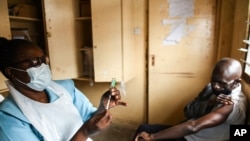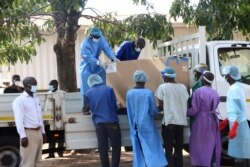Malawi expects to receive more than 600,000 doses of COVID-19 vaccine soon. In May, the country had to discard 20,000 doses due to a lack of demand. But officials say that when the new vaccine arrives, demand will be high and Malawi will be prepared.
Over the next two months, Malawi is expected to receive about 372,000 doses of the Pfizer vaccine and about 300,000 doses of the Johnson & Johnson vaccine.
Experts are warning the country needs to be ready to store and distribute it.
In May, authorities burned about 20,000 expired doses of the AstraZeneca vaccine that went unused due to a shortage of distribution centers and widespread vaccine hesitancy, the latter caused by myths and misinformation about their safety.
Queen Dube is chief of health services in Malawi’s Ministry of Health. She said there will be no repeat of that incident, because a government campaign has now convinced Malawians the vaccines are safe and protective.
She notes that a recent consignment of 192,000 AstraZeneca vaccines, which the country received last Saturday were gone within days.
Even if some of the donated vaccines are due to expire soon, they will be distributed within sufficient time, she said.
“It’s this scenario where you have one week of shelf-life left that puts you in very difficult circumstances," Dube said. "But, you know, we have created demand. Remember on 27th [July] we vaccinated 75,000 people and so even if we had all those doses that were to expire in two weeks, say for example 100,000 doses, we should be able to quickly use them within two, three days.”
Dr. Alinafe Kasiya is a public health expert with VillageReach, an international health organization that is supporting vaccine delivery in African countries.
He said countries need to think about their storage and distribution systems.
“That means a number of things; Do we have enough capacity to be able to store the vaccines that are coming?" Kasiya said. "I mean some of the vaccines might have different cold chain requirements. But also do we have a logistic system in place to be able to move these vaccines around? Do we have enough people trained? Are we opening up enough sites? Are we looking at doing more to create demand?"
Kasiya, the country director for VillageReach in Malawi, applauds Malawi’s government for creating demand for the vaccine.
Queen Dube says even though the Pfizer vaccine needs ultra-cold storage, no doses will be wasted.
“There are two things with Pfizer," Dube said. "We now have evidence that if you take it out of an ultra-cold system you can store it at temperatures between two to eight degrees. These are normal temperatures that we store our vaccines in; and you can use it for 31 days.”
So far, Malawi has recorded about 51,000 cases of COVID-19 and nearly 1,600 deaths. Only a tiny fraction of the country’s 18 million people have been inoculated, though that number will quickly rise if more people cooperate with the government’s vaccination campaign.
This article was updated to correct both the spelling of VillageReach and the description of that organization.





